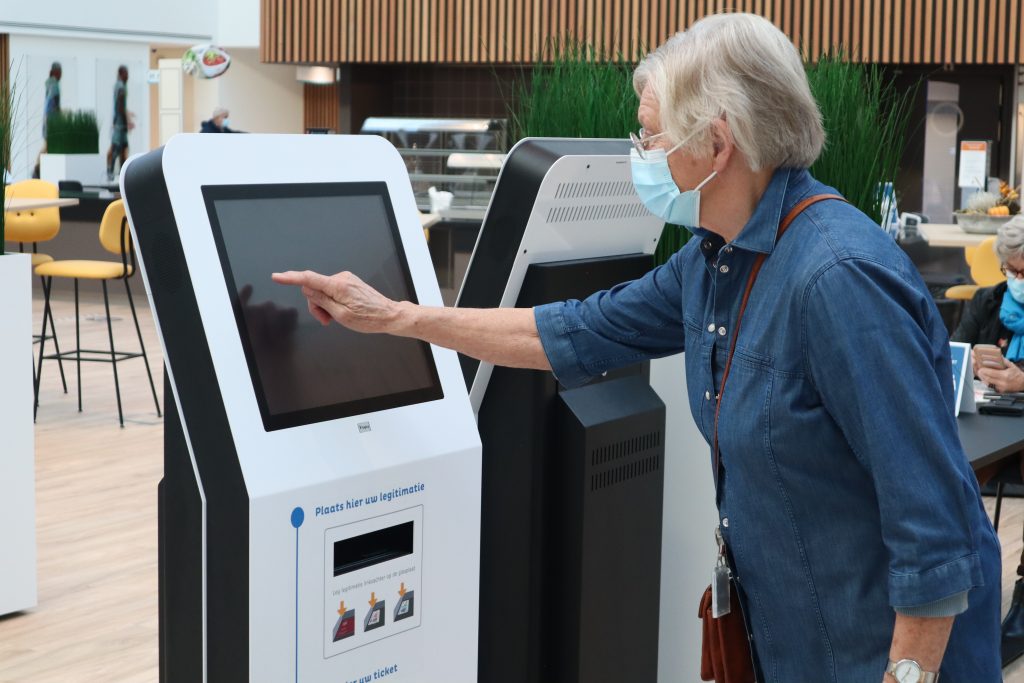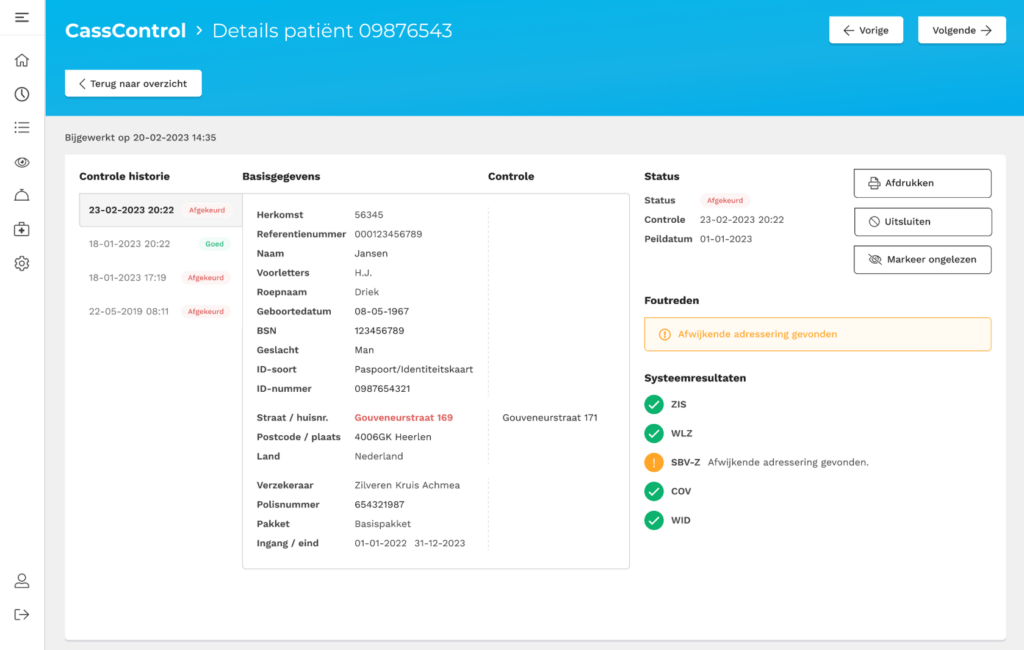The Rode Kruis Ziekenhuis Beverwijk (RKZ) has put the new Logis.P Universe platform in commission. Improved digital information points, in combination with future-proof software contribute towards further easing the pressure on healthcare logistics and administrative tasks. The Rode Kruis Ziekenhuis receives approximately 180,000 polyclinic visits a year.
Welcome and Reception Project
Logis.P first supplied the hospital in Beverwijk with digital check-in points, including software and integration with its own information systems in 2013, but these systems needed to be updated. The hospital started the selection process for the replacement of the amortised hardware and software with new versions, which are more compatible with the current process, as well as with future developments, as a component of the ‘Welcome and Reception’ project. A working group with broad representation was formed to draw up a Programme of Requirements. The participants included, among others, the Care manager, the department heads of the polyclinics, the staff of the Customer Contact Centre and the Volunteer coordinator. Other representatives included the Sales department and the Automation & Application Management units.
Specialism
Two of the four providers made it into the selection phase: Logis.P and the provider of Ziekenhuis Informatie Systeem. Rode Kruis Ziekenhuis ultimately chose the Logis.P solution. The reasons for this choice included not only the financial and positive experience in prior collaborations with Logis.P, but primarily their preference for the specialism. The optimisation of patient logistics is a core activity and specialism at Logis.P. A clear vision and roadmap in this domain offered clarity on future possibilities.
Implementation
The transition to the new system at RKZ took several months. Implementation was started at the end of September 2020. The team consisted of a number of specialists at Logis.P and stakeholders at RKZ. Following the preparatory phase, the team started working towards a delivery date in January 2021. In spite of the challenges related to the COVID-19 epidemic, the project was delivered on schedule and within budget.
“They experienced the Agile implementation methodology utilised by Logis.P very positively,” says Peter Klingeler, Technical Application Manager of the RKZ. “The clear planning of the project and activities, executed in short sprints, yielded solid results. The consultants and developers were directly involved in the customer processes thanks to knowledge transfer and knowledge sharing between the RKZ and Logis.P.”
New
Patients at Beverwijk could check in at the digital check-in point and register with a patient card in the past. This meant that, in most instances, they did not need to physically check in at the polyclinic’s service desk. The route represented on the ticket corresponds to the routing in the hospital, which works with clear route indications (the letters, C, D, E, F and G). This prevents patients from wandering around in search of the relevant polyclinic. All of this was retained in the migration to the current Universe platform.
A new element is that patients now check in with their ID documents. Changes were also made to the queue management system for the registration desk. In this process, if their personal data is incomplete or not entirely correct, the patient is issued with a ticket and call number at the registration desk. The service desk staff can then check the data concerned in the Logis.P application and take immediate action.
- Logis.P specialism
- Agile work method
- Future resistant
“They experienced the Agile implementation methodology utilised by Logis.P very positively.”
Peter Klingeler, Technical Application Manager of the RKZ
Waiting Room Planning
A good example of the flexible and solution oriented Logis.P modus operandi is the establishment of the Waiting Room Planning functionality. The RKZ had a number of wishes for the improvement of the older system.
RKZ was looking for a low-threshold solution in which the different departments could independently make changes to the agendas of the doctors and therapists.
Logis.P, worked in close cooperation with the RKZ stakeholders to develop a completely new application as part of the implementation project. It is now easier than ever before to make and synchronise digital changes without the need for manual puzzling or input from the management department. It also makes it possible to determine exactly where a doctor is or where they are working, and to which waiting room the patient must be referred after checking in. This kind of flexibility is on the wish list of many hospitals.
Results
The desired objectives of the new system have thereby been fulfilled. After the completion of the internal renovation of the hospital, the check-in system will be further extended with decentralised check-in points (tablets) at the polyclinics.
An additional benefit is that the new check-in points will also give the hospital a refreshing exterior appearance. Setting up the old check-in points in the atrium, with its glass roof, called for the use of terrace parasols to temper the incoming light. The new check-in points have been fitted with integrated sun hoods.
This completes the implementation of the Beverwijk patient journey, which will partly be determined by technological developments. Digital information points are not the only possible solution for guiding patients on the journey through the hospital. It is expected that the smart phone will be the main resource for guiding the patient to the polyclinics in the future. Logis.P already has those solutions at its disposal.
Logis.P Universe Agile Process
Five HL7 connections were implemented between Logis.P and HiX in the RKZ project, as well as web interfaces for insurance legislation regulation (COV), the validity of the ID document (WID) and the address details based on the citizen service number (SBV-Z).
Implementation:
In this phase, we collaborate with the customer to complete the sub-goals in sprints. Part of the scheduled work is delivered in each sprint. We call this an agile strategy with multidisciplinary teams operating in short cycles. It helps to prevent delays in the implementation.
Testing:
In this phase, tests are conducted for the customer under the supervision of the consultants.
Going Live and Aftercare:
The consultants attend the go-live phase to supervise the process and resolve problems. After that, the helpdesk at Logis.P takes over the support.


